This is the surprisingly colorful view from Mesa Verde National Park, looking west toward the Ute Mountain Reservation. I don't know what the purple and green and yellow vegetation is, but it's pretty striking.
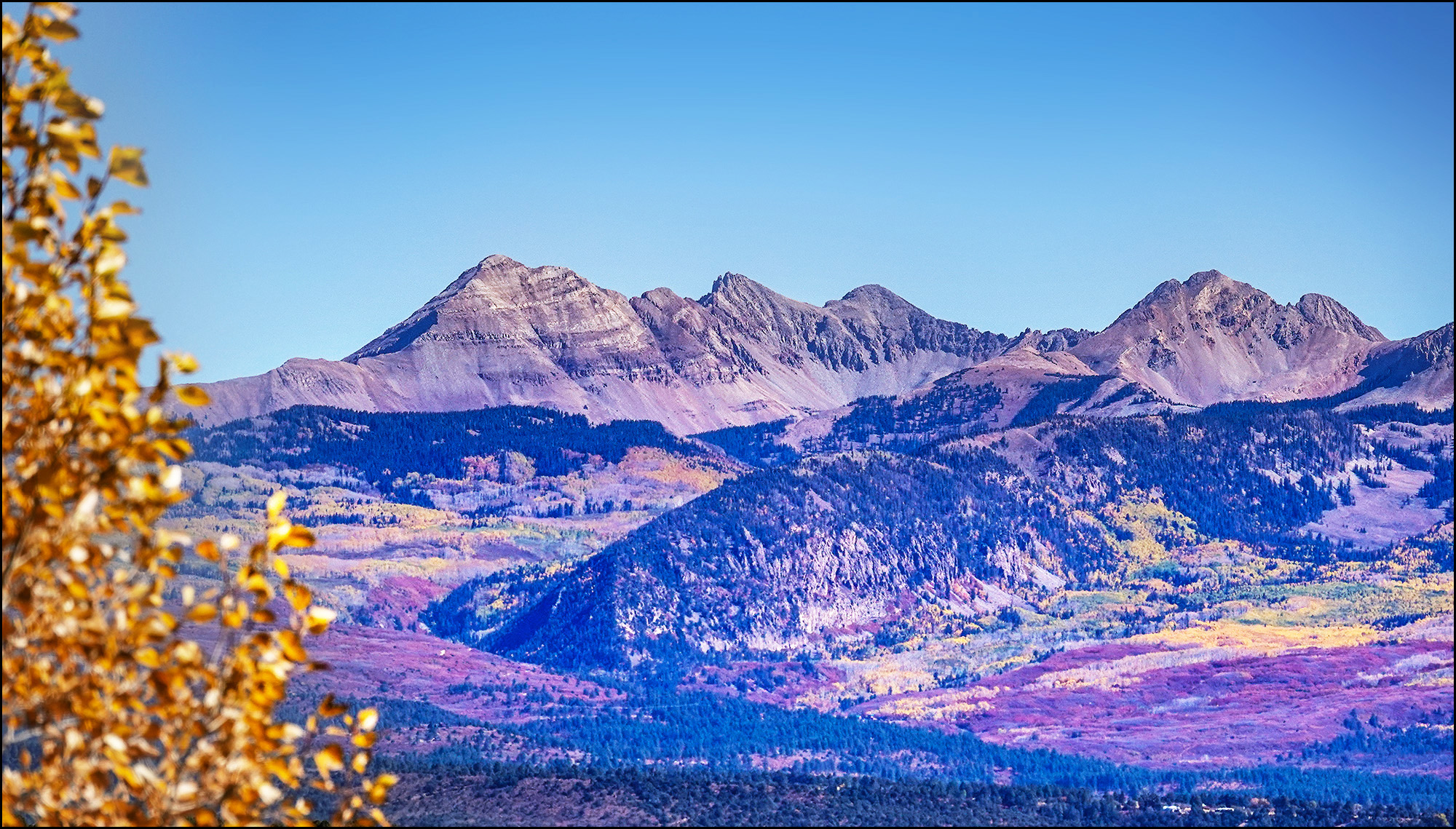
Cats, charts, and politics

A group in California is hoping to make financial literacy a requirement in high school:
The plan is to make all high school students, as a condition of graduation, take at least a one-semester class in financial literacy.... Petition organizers said Tuesday that they are submitting nearly 900,000 signatures to county registrars across the state to qualify the California Personal Finance Initiative for the November election.
I've got nothing against financial literacy, but this would join media literacy and computer literacy in our current fad to make kids "literate" in the business of daily life.
But what I really want to know is whether there's any evidence of a growing problem with financial literacy. I can't find any. There are no long-term tests of financial literacy that I can locate, and overall financial indicators aren't flashing any red lights. Over the past few decades, both mortgage delinquency and credit card delinquency are down. Retirement accounts are up. Installment loan balances are down. Foreclosures and bankruptcies are down. Savings are up. Overdrafts are down.
Maybe I'm missing something, but I just don't see any special evidence that financial literacy is in some sort of crisis state. Nor am I convinced that a financial literacy course would actually change the habits of ordinary human beings, who mostly do dumb stuff because they feel like it, not because they're unaware it's dumb. So why is this necessary?
Show me the evidence or gtfo.
More bad news on the inflation front. The Producer Price Index, which measures wholesale prices, surged in February. Goods remain below their peak prices of 2022 but spiked up 15.5% between January and February on an annualized basis. Services continued their steady rise and were up 3.6%.
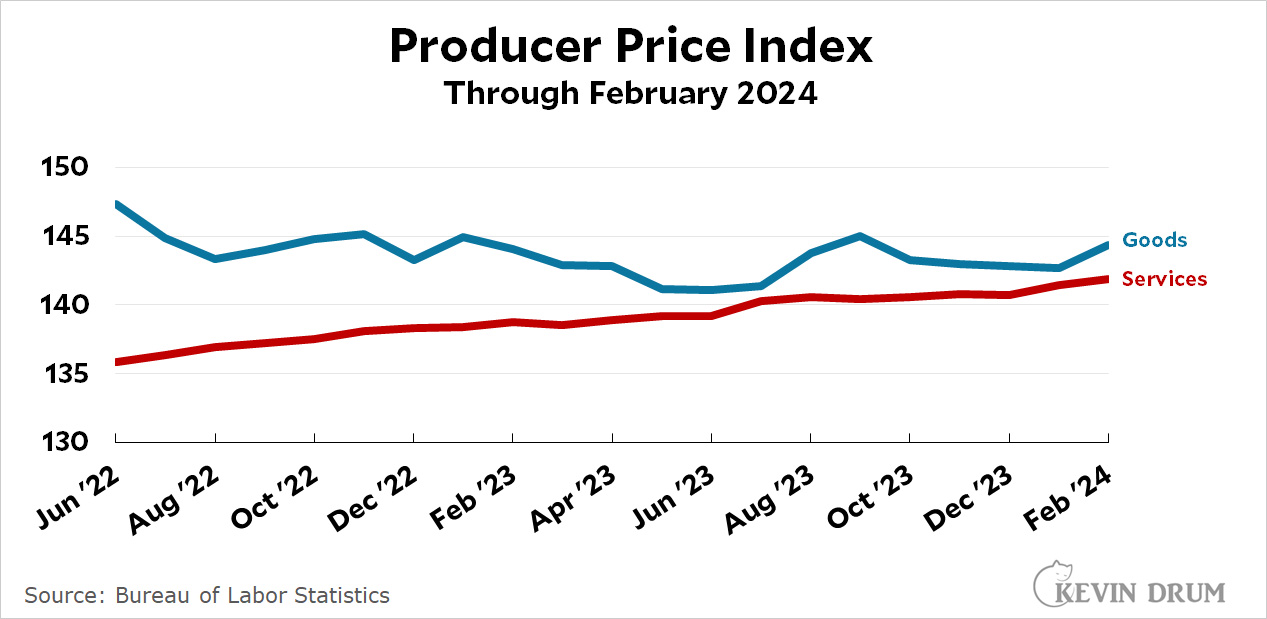 PPI tends to be volatile, and two-thirds of the spike in goods was due to energy. Still, since PPI increases tend to eventually feed through into consumer goods, this is not good news.
PPI tends to be volatile, and two-thirds of the spike in goods was due to energy. Still, since PPI increases tend to eventually feed through into consumer goods, this is not good news.
The primary objection to Chinese ownership of TikTok is based on stats showing that something like a third of teenagers "regularly" get news from TikTok—which could make them targets for Chinese propaganda. But this is based on survey data, and most people have a very wide definition of news. It includes celebrity news, sports news, music news, movie news, and so forth. So how much real news do most people get from TikTok?
Spoiler alert: There's no way to know for sure. There just aren't any concrete statistics for what you and I think of as "real" news (politics, foreign affairs, the economy, etc.). However, I got curious about this and after doing a bit of digging I think we can make a pretty good guess.
First, here are a couple of rankings of the most popular topics on TikTok:
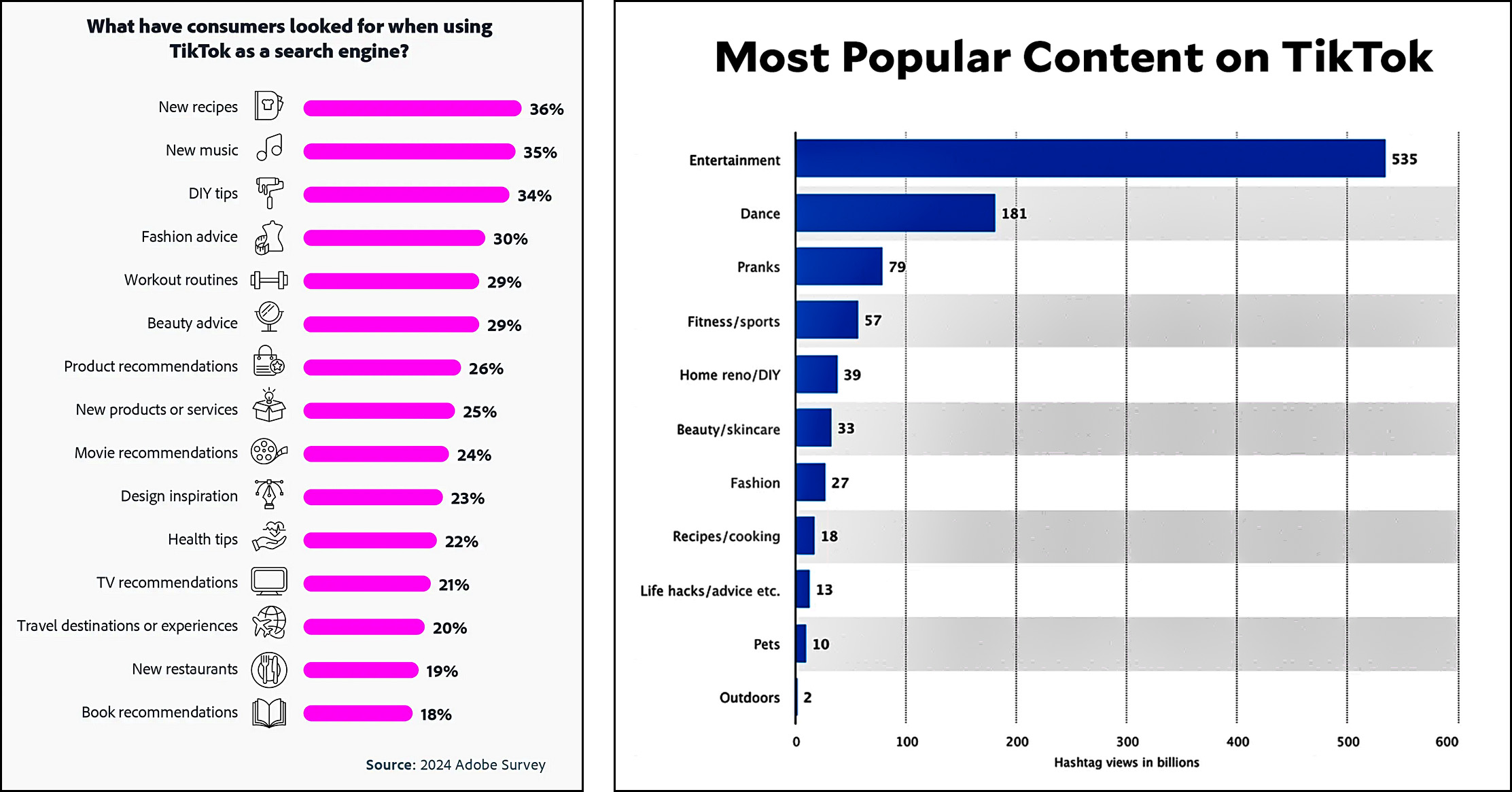 News is nowhere to be found. You can find dozens of different estimates like this, and they're all the same: TikTok users are interested in entertainment, sports, fashion, health, etc. etc. Not news.
News is nowhere to be found. You can find dozens of different estimates like this, and they're all the same: TikTok users are interested in entertainment, sports, fashion, health, etc. etc. Not news.
Here's another chart, this one dedicated solely to real news:
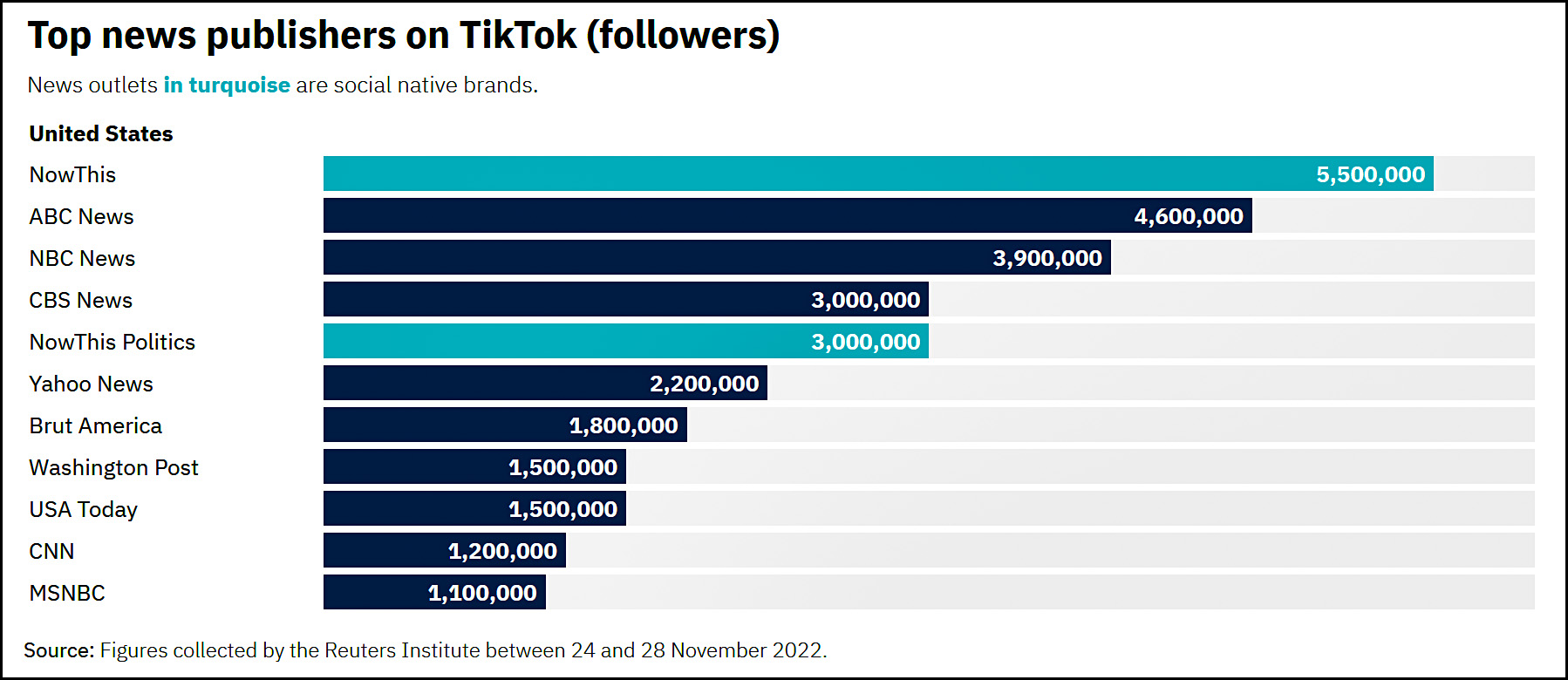 These are the top conventional news sources on TikTok, and taken together they have about 30 million followers. By contrast, a list of the 50 most popular TikTok accounts has about 3 billion followers, and not a single one of the accounts in the top 50 is news related.
These are the top conventional news sources on TikTok, and taken together they have about 30 million followers. By contrast, a list of the 50 most popular TikTok accounts has about 3 billion followers, and not a single one of the accounts in the top 50 is news related.
Among unconventional sources, the biggest accounts have around 10 million followers. That's more than traditional publishers, but still a tiny drop in the TikTok bucket.
Finally, a couple of researchers took a look at news served up by TikTok's algorithm last year. An online article summed up their conclusions like this:
The findings reveal a considerable lack of user interest in news coverage on TikTok.... Users are primarily exposed to entertainment content, trending news topics tend to lean towards entertainment, and news producers receive limited engagement.
Put all this together and it points in one direction: TikTok users probably get very little real news from either conventional or digital native sources. My horseback guess based on everything I dug up is that maybe 5% of teens get any real news from TikTok, and probably not very much of it. This means that their potential exposure to Chinese propaganda is tiny because they don't pay attention to news in the first place.
I'd be very interested in a survey that dived deeper and asked TikTok users what kind of news they typically get and how much of it they get each day. I have a feeling the results would be instructive.
Denmark has given us Legos, Earth Shoes, Danish pastry, Google Maps, the Egg chair, Scanpans, Carlsberg beer, C++, Christmas plates, the international wheelchair symbol, open-faced sandwiches, and Ozempic. Clever people, those Danes.
Comments are back up! Apparently some kind of noaccess code got mysteriously added to the site, but Bluehost deleted it and now everything is fine.
After being let go from CNN, Don Lemon cut a deal with Elon Musk for a show on Twitter. Lemon's first episode was an interview with Musk, after which the deal was abruptly canceled. Why?
His approach was basically just “CNN, but on social media”, which doesn’t work, as evidenced by the fact that CNN is dying.
And, instead of it being the real Don Lemon, it was really just Jeff Zucker talking through Don, so lacked authenticity.
All this said, Lemon/Zucker are…
— Elon Musk (@elonmusk) March 13, 2024
I don't really care whether Twitter hosts a Don Lemon show. But what a weird excuse for killing a deal. There's something wrong with Elon's brain.
Among the various ways of estimating worker pay, one of the most accurate is the BLS calculation of employer costs. This is released quarterly, and in Q4 of 2023 wages and salaries for civilian workers increased by a whopping 10%:
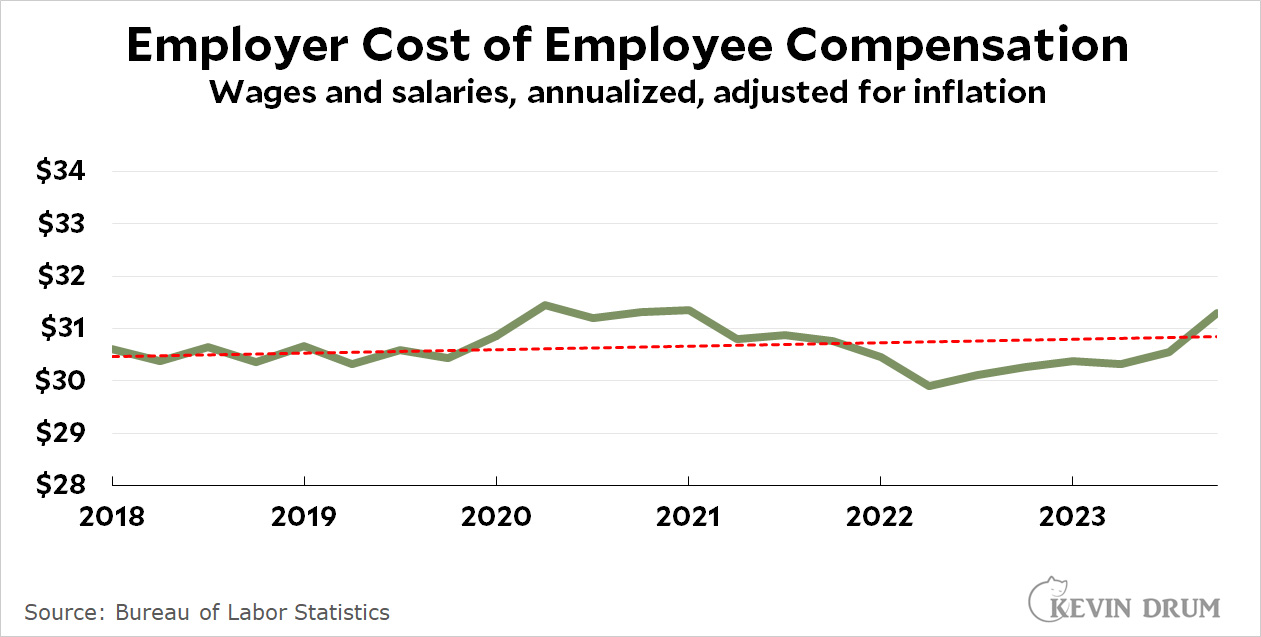 From Q3 to Q4, wages increased 3.1%. Adjusting for inflation and then annualizing the quarterly change produces a 10% increase on an annualized basis.
From Q3 to Q4, wages increased 3.1%. Adjusting for inflation and then annualizing the quarterly change produces a 10% increase on an annualized basis.
Total compensation, including benefits, was up 11.2% on the same basis.
This is.......a little hard to take in. Unless I slipped a digit that's a huge increase, and it's way bigger than the increase in the Employer Cost Index over the same period (about 1%). I'm not sure what to make of this.
Today the House passed a bill to effectively ban TikTok unless it's acquired by an American company:
Republican leaders fast-tracked the bill through the House with limited debate, and it passed on a lopsided vote of 352 to 65, reflecting widespread backing for legislation that would take direct aim at China in an election year.
I know I'm talking my book here, but I'm skeptical of any bill that passes by a huge margin like that. I mean, Democrats and Republicans couldn't muster 352 votes for a Mother's Day resolution these days, but they're all willing to ban TikTok? This smacks of panic and election year pandering.
I wonder how effective it would be anyway? The bill would ban TikTok from app stores or from being hosted on US web servers. That's a big blow. But it wouldn't do anything about the gazillion people who already have the app, and moving TikTok to, say, Chinese servers wouldn't be any big deal. Future users could either download the app manually—which is tricky but hardly impossible—or use a web version. This is obviously not ideal for TikTok, but it would probably work.
If this happened, it would make things even worse from a national security perspective. TikTok would have no incentive to keep US data in Texas and no incentive to host its service anywhere but China. And teens might actually be attracted to TikTok even more once it becomes forbidden fruit.
We'll see what the Senate does. But I do wish that Congress had a little more faith in the American system of democracy and open debate. Even if TikTok is subtly promoting Chinese propaganda, what do you think is the best way of fighting it? The Chinese system of banning and censoring, or the American system of letting everyone fight it out in the marketplace of ideas? Sign me up for the latter, please, and not just because of a knee-jerk love of all things American. I genuinely think that in the long run our way of doing things is a lot more productive than the Chinese way.